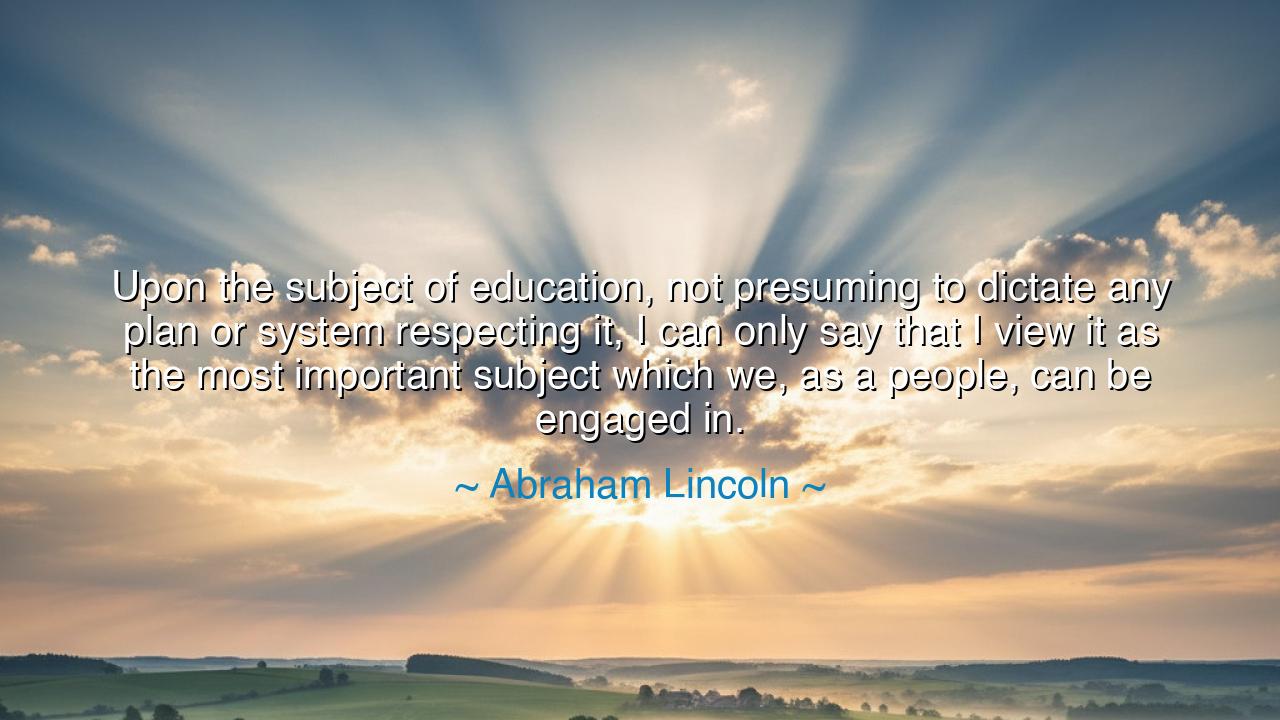
Upon the subject of education, not presuming to dictate any plan
Upon the subject of education, not presuming to dictate any plan or system respecting it, I can only say that I view it as the most important subject which we, as a people, can be engaged in.






“Upon the subject of education, not presuming to dictate any plan or system respecting it, I can only say that I view it as the most important subject which we, as a people, can be engaged in.” Thus spoke Abraham Lincoln, the great emancipator, the self-taught statesman whose wisdom rose not from privilege, but from perseverance. In this declaration, Lincoln reveals not merely an opinion, but a sacred truth—that education is the lifeblood of a nation, the foundation upon which liberty and civilization stand. Though he offered no grand scheme or intricate policy, his words ring with the quiet power of conviction: that a people’s greatness depends not upon its wealth or its weapons, but upon the enlightenment of its citizens.
To call education the most important subject is to recognize it as the guardian of freedom itself. For ignorance breeds servitude, but knowledge gives birth to dignity. A society that neglects the education of its people digs its own grave; one that nurtures it secures its future. Lincoln, born in the wilderness with little formal schooling, knew this truth in his bones. He had no tutor but his own hunger for understanding, no library but a handful of borrowed books, and yet, through learning, he rose from obscurity to guide a fractured nation through its darkest hour. His reverence for education was not theoretical—it was born of experience.
Abraham Lincoln spoke these words long before his presidency, in the days when America was still young and uncertain of its path. He saw that the republic, newly formed and fragile, could not survive on laws alone—it required minds shaped by reason, morality, and curiosity. He feared not the power of armies, but the decay of intellect and virtue. For to him, the true battlefield of a nation was not fought with muskets, but with ideas; not in the noise of war, but in the silence of the classroom. It was in the education of the people that he saw the hope of democracy—the power of ordinary men and women to think for themselves, to govern themselves, and to lift themselves from poverty and despair.
And history vindicated his belief. When Lincoln became president, he established the Morrill Act of 1862, which created land-grant universities across the United States. From that seed grew countless institutions dedicated to teaching science, agriculture, and the liberal arts—knowledge that strengthened both hand and mind. Though born in the midst of civil war, these schools embodied Lincoln’s vision of a free people advancing through learning. Even as the nation bled, he thought of generations unborn, ensuring that education would remain the cornerstone of progress. His legacy thus proves his words: that no endeavor is more vital, more noble, more enduring than the cultivation of the human mind.
The ancients, too, shared this truth. Plato, in his Republic, wrote that the uneducated man is like one chained in a cave, seeing only shadows, while the educated man is the one who turns toward the light of truth. Lincoln, though he never read Plato in Greek, lived that philosophy. He understood that education is the process of turning a people toward the light—of freeing them from superstition, prejudice, and despair. A nation’s strength, he knew, is not in its rulers but in its citizens. When the people think clearly, they govern wisely; when they are ignorant, they are governed poorly. Thus, he declared that to educate is not merely to instruct, but to preserve liberty itself.
Yet, Lincoln’s humility shines through his words. He says, “not presuming to dictate any plan or system respecting it.” He does not claim to possess the perfect design for education, for he understood that its form must evolve with time and need. What mattered to him was not the method, but the devotion—the shared belief that education is sacred work. He calls upon the people themselves to engage in it, to make it their collective duty and highest calling. For in the end, education is not the responsibility of governments alone—it is the work of families, communities, and individuals who choose to elevate themselves and others.
Therefore, O seeker of truth, heed this wisdom from the lips of one who rose from obscurity to greatness: cherish education, for it is the soul’s liberation. Do not measure learning by degrees or titles, but by understanding and virtue. Teach your children not only to read, but to think; not only to remember, but to discern; not only to work, but to serve. Build schools not only of brick, but of conscience—places where knowledge awakens compassion and wisdom walks hand in hand with humility.
The lesson is clear: a nation that treasures education will never perish, and a person who pursues it will never be lost. As Abraham Lincoln taught, the true strength of a people lies not in their leaders, but in their learning. So let each of us, in our own time and place, engage in this most important subject—to seek truth, to cultivate goodness, and to light the path for those who will follow. For in doing so, we honor both the mind of man and the destiny of humanity itself.






AAdministratorAdministrator
Welcome, honored guests. Please leave a comment, we will respond soon